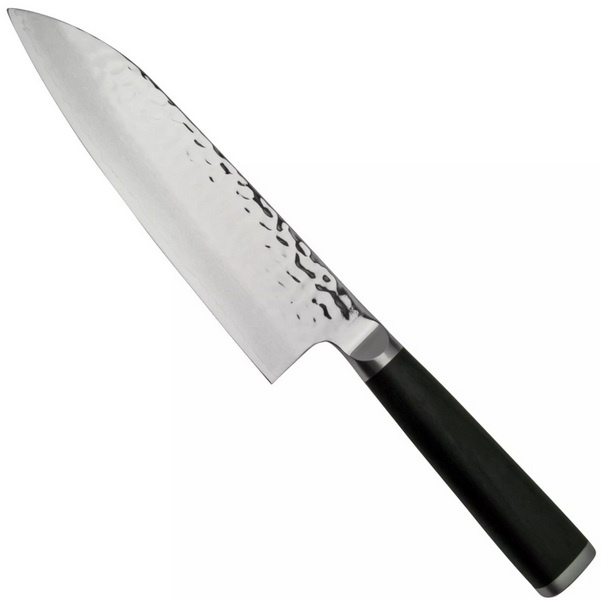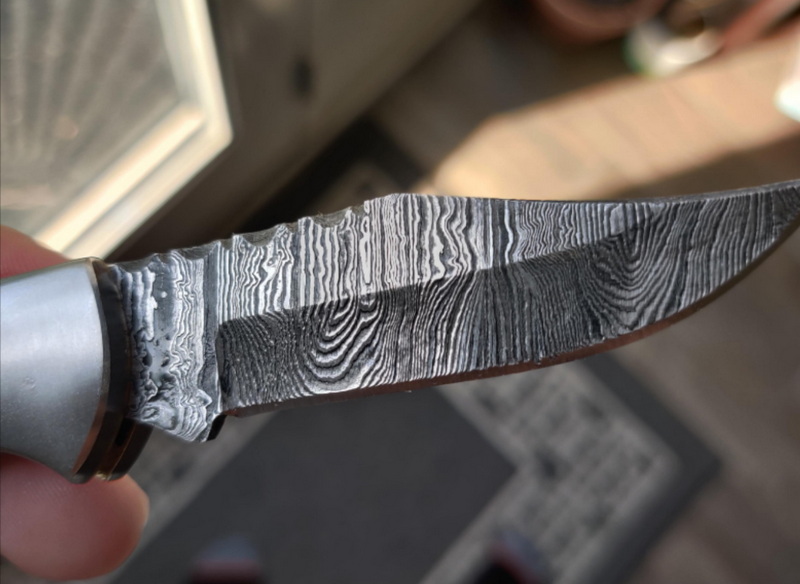- All
- Product Name
- Product Keyword
- Product Model
- Product Summary
- Product Description
- Multi Field Search
Views: 222 Author: Ann Publish Time: 2025-10-15 Origin: Site











Content Menu
● Introduction to Damascus Knives
● The History and Craftsmanship of Damascus Steel
● Types of Damascus Kitchen Knives and Their Uses
● Investment and Price Considerations
● Care and Maintenance for Damascus Knives
● Comparison with Regular Steel Knives
● Collector's Appeal and Customization
>> Q1: How do I identify a genuine Damascus knife?
>> Q2: Can Damascus knives rust?
>> Q3: Are Damascus knives dishwasher safe?
>> Q4: How often should I sharpen my Damascus knife?
>> Q5: Are Damascus knives suitable for outdoor activities?
Damascus knives have long fascinated chefs, collectors, and kitchen enthusiasts with their distinctive wavy-patterned steel blades that blend artistry, history, and high functionality. The term "Damascus" refers to an ancient steel-making technique that produced blades renowned for exceptional strength, flexibility, and unique visual patterns. Today, Damascus knives are not only admired for their beauty and craftsmanship but also celebrated for their outstanding performance in culinary tasks.

Damascus steel traces its origins back to the Near East, especially rooted in techniques associated with the ancient city of Damascus. Classic Damascus steel was crafted using wootz steel imported from India, known for its ability to combine hardness with toughness. The forging process involved repeated folding and welding layers of steel, producing distinct flowing patterns that are emblematic of Damascus blades.
Modern Damascus knives recreate these mesmerizing patterns through a process known as pattern welding. This technique layers different types of steel and forges them together before acid etching brings out the signature patterns. Each blade displays unique markings, making every Damascus knife a one-of-a-kind piece of functional art.
One of the primary reasons why Damascus knives are considered worth the investment is their balanced combination of performance and aesthetics. The layered structure of the blade significantly enhances edge retention, allowing Damascus knives to stay sharp longer compared to conventional kitchen knives. This reduces the need for frequent sharpening—a convenient benefit for regular kitchen use.
Furthermore, the melding of hard and flexible steels provides superior durability, ensuring the blade handles everyday cutting tasks without chipping or breaking. The resilience of Damascus steel makes it ideal for slicing, dicing, chopping, and even tougher tasks such as cutting through dense vegetables or meat.
Although Damascus knives are visually striking, their functionality often meets or exceeds that of standard high-quality steel knives. For cooks who value precision, efficiency, and the beauty of their instruments, the Damascus knife is a rewarding choice.
Damascus steel technology is applied to a wide array of kitchen knives, ensuring that users can find the perfect blade for their culinary needs. Popular types include:
- Chef's knives: Renowned for their versatility, Damascus chef's knives balance weight and sharpness, making them the workhorse of any kitchen.
- Utility knives: Smaller than chef's knives, perfect for slicing fruits, vegetables, and smaller proteins with precision.
- Cleavers: Heavy-duty knives that benefit from the robustness of Damascus steel for chopping through bones and tough ingredients.
- Paring knives: Excellent for delicate tasks like peeling and intricate cuts, featuring smaller Damascus blades.
- Boning knives: Their sharp, thin, and flexible blades allow for precision deboning of meat and fish.
The high resilience and sharpness of Damascus steel elevate the performance of these knives, whether used by professional chefs or home cooks seeking a premium cutlery experience.
The craftsmanship and raw materials used in making Damascus knives contribute to their premium pricing. Entry-level Damascus knives are available within the $50 to $100 range, catering to buyers who want to experience the aesthetics and sharpness without a heavy investment. These typically feature modern pattern-welded steel and good construction.
Mid-range Damascus knives, favored by culinary professionals and serious home cooks, usually cost between $200 and $500. These knives provide enhanced materials, superior edge performance, and finer craftsmanship. High-end custom knives can surpass $500 and often reach into the thousands, featuring rare metals, hand-forged blades, and custom handle materials like exotic woods, providing both functionality and collectible value.
Considering the durability, edge retention, and the sheer artistry of each blade, many users find the investment in a Damascus knife justified as it offers both practical and aesthetic rewards.

To preserve the beauty and longevity of a Damascus knife, proper care is essential. These knives usually incorporate high-carbon steel layers, which are vulnerable to rust if neglected. Here are key maintenance tips:
- Always hand wash with mild detergent and avoid soaking the blade.
- Immediately dry the knife to prevent moisture from causing oxidation.
- Use a wooden or plastic cutting board to reduce blade wear.
- Sharpen with quality whetstones to maintain the blade's sharpness without compromising the pattern.
- Occasionally apply mineral oil or specialized protective wax to the blade to guard against moisture and enhance appearance.
With consistent care, a Damascus knife can maintain its cutting edge and stunning pattern for decades.
Damascus knives stand out visibly and functionally from standard steel knives. Aesthetically, the unique and unpredictable patterns on Damascus blades add a layer of artistry that conventional knives lack. From a functional perspective:
| Feature | Damascus Knife | Regular Steel Knife |
|---|---|---|
| Visual Aesthetics | Unique, wavy patterned surface | Plain or uniform finish |
| Edge Retention | Superior due to layered steel | Varies, often lower than Damascus |
| Durability | High flexibility and strength | Generally less flexible, more brittle |
| Maintenance | Requires careful cleaning and drying | Easier routine maintenance |
| Price | Premium, ranges from moderate to high | Generally more affordable |
The trade-off typically involves investment in maintenance for Damascus knives, rewarded by enhanced cutting performance and distinct beauty.
Damascus knives are also prized among collectors and enthusiasts who appreciate their historical significance and artisanal qualities. Custom Damascus knives offer bespoke options including:
- Personalized handle materials such as rare woods, bone, or resin.
- Custom blade etching and unique pattern designs.
- Limited edition releases by skilled blacksmiths, offering exclusivity and value appreciation.
Collecting personalized Damascus knives combines passion for fine craftsmanship with practical kitchen utility, making it an attractive niche for collectors and gift buyers.
Investing in a Damascus knife offers an exceptional blend of art, history, and practical kitchen performance. While these knives represent a higher price point than typical steel knives, the benefits of superior edge retention, unique visual appeal, durability, and craftsmanship make them a worthy addition to any kitchen. With proper care, Damascus knives can serve as both reliable culinary tools and collectible heirlooms, standing the test of time while elevating the cooking experience.

A: Genuine Damascus knives have unique, non-repeating wavy patterns visible on both sides of the blade, often accompanied by manufacturer certificates or proof of layered steel construction.
A: Yes. Because many Damascus knives contain high-carbon steel, they are prone to rust if not dried and stored properly. Regular oiling helps prevent oxidation.
A: No. The harsh detergents and heat in dishwashers can damage the blade's finish and cause corrosion. Hand washing and immediate drying are recommended.
A: For typical home use, sharpening every few months is sufficient, coupled with regular honing. Professional use may require more frequent sharpening.
A: While durable, Damascus knives are primarily designed for kitchen use. If used outdoors, thorough cleaning and drying are necessary to avoid rust and damage.
The Ultimate Professional Knives for Halal Butchery in Middle Eastern Kitchens
Chef Knife Size Guide: Choosing Between 6″, 8″, 10″, And 12″
Custom Knife Handles: How To Design A Chef Knife That Fits Your Hand Perfectly
Chef Knife Surface Treatments Guide: From Polished Migaki To Damascus Patterns
Inside Our Professional Knife Sample Room: Quality You Can See
Universal Knife Block Buying Guide: Modern Acrylic & ABS Knife Holders for Professional Kitchens
Universal Knife Block: The Complete Guide To Modern, Hygienic Knife Storage
The Complete Guide To Red Handle Knife Sets: Style Meets Functionality in The Kitchen
Professional Knives for Halal Butchery And Middle Eastern Cuisine